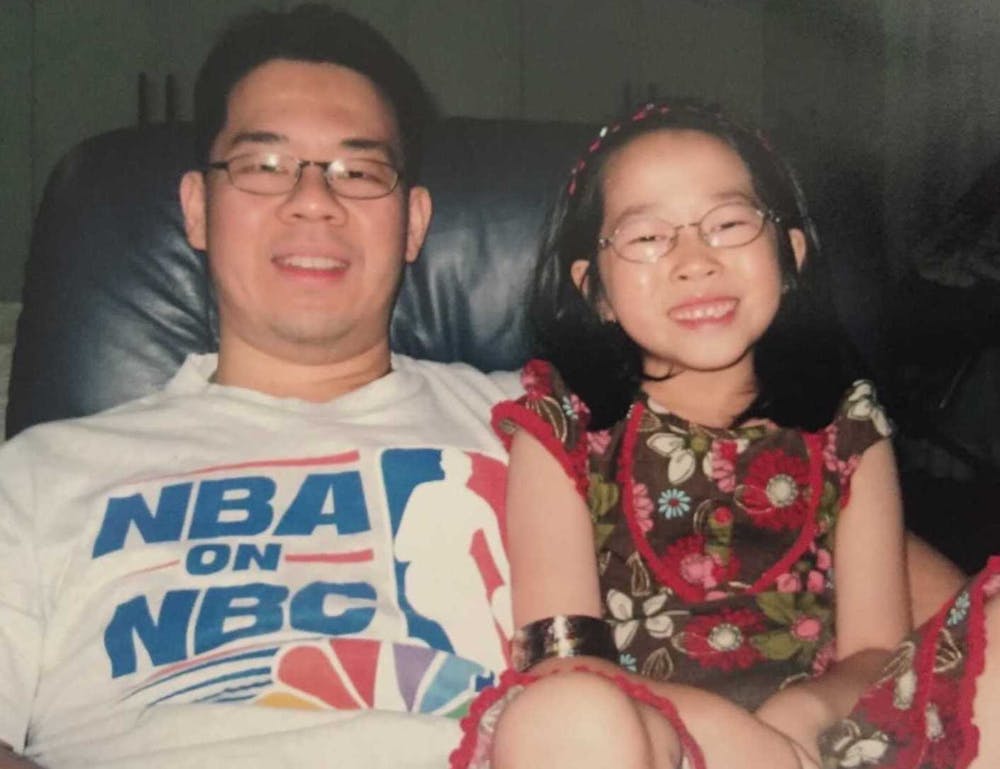
I chose my column name for two reasons: I wanted to focus on positivity, and I’ve needed glasses my whole life... until now.
When I was in elementary school, I was always known as the girl with glasses. Due to an unfortunate mix of poor genetics and playing Wii and Nintendo DS during my childhood, I was forced to don wired spectacles by six years old. At such a young age, I already knew that I would eventually need laser eye surgery when I was older, just like my dad did and like my younger brother will eventually need, too. Every year, my eye grade would shoot up by 100 points, and my astigmatism would worsen, eventually reaching a grade of 850 by the time it stabilized.
In fact, I used to track my age in childhood photos based on which glasses I was wearing — from thin purple frames with teddy bears on them, to rainbow glasses, to red glasses, to blue-green ones, to tortoiseshell frames, to clear frames. My childhood friends have seen them all and often like to tease me for the rainbow frames in particular.
Glasses became both an insecurity and comfort for me. Those who wear glasses were stereotyped as nerdy, smart or the overachievers of the class, which made me envious of those with 20/20 vision. However, it became a mental conflict because I also assumed the same stereotypical identity in school and saw it fitting for my character.
When I began wearing contacts so I could play basketball, I was so dependent on my glasses that I even bought frames with no-grade lenses to wear during the day, which I only used for a few weeks until I learned to stop hiding behind my frames. Later on, I realized the convenience of wearing contacts and began using them much more.
Because I had to wear them 24/7, glasses always seemed to be a hassle to me. They prohibited me from swimming, had to be replaced annually and made it more difficult to exercise, play sports or watch 3D movies. And with the pandemic, glasses made it harder to accomplish tasks with a mask on because they would fog up or not stay on properly, especially with N95 masks.
Contacts did make life easier, but they were also painful. I’m sure all contact wearers understand the pain of accidentally tearing them the first few times, not being able to remove them with long nails, worrying about falling asleep with contacts during a late night out and developing painful red eyes after wearing them all day. I’m not trying to discount these options since they are definitely revolutionary aids, but they were doing me more harm than good.
At the back of my mind, I was constantly counting down the days until I could get what my dad calls the “life-changing surgery.” I was waiting for the moment when I could finally wake up, immediately see clearly and enjoy the beach’s waves and sunlight without being blind. My uncle, who is my optometrist, had given me the go-ahead signal for eye surgery in 2020, but with the hospitals full of COVID-19 patients, cosmetic surgery was not a priority.
Finally, during the summer of 2021, when I was spending time at home because of the pandemic, cases had gone down a bit and I was able to have the photorefractive keratectomy surgery done! The sensations after were both weird and exciting, where it felt like I was seeing the world much clearer but underwater for a while. The pain was excruciating for a few days too. But even now, approximately two months after recovering, it still feels surreal to accomplish simple tasks without glasses, and I am very grateful to have had the procedure. Sometimes, I find myself performing old habits, like pushing phantom glasses up the bridge of my nose or momentarily panicking about overusing my non-existent contacts.
While I do not miss my struggles and insecurities from wearing glasses, I do miss what they represented: wisps of my childhood identity that are long gone or have bloomed. Now that I am finally back at Hopkins, I have to take care of myself once again, and the reality that I will only become more independent from here on out is settling in. I no longer have to rely on my glasses in the same way that I can no longer rely on the past.
Of course, my experience is not that unique. After all, 40% of Americans wear glasses and hundreds of thousands of people have the surgery annually. But I do find it therapeutic to reflect on my past to note how it has shaped my present growth and maturity. Though I have shed my dependence on glasses in favor of learning to be comfortable in my own skin, I aim to continue viewing life through figurative rose-tinted glasses.
Michelle Limpe is a junior from the Philippines studying Chemistry and Public Health. She is a Managing Editor for The News-Letter. In her articles, she likes to reflect on finding the silver linings in life to give meaning to her struggles.





